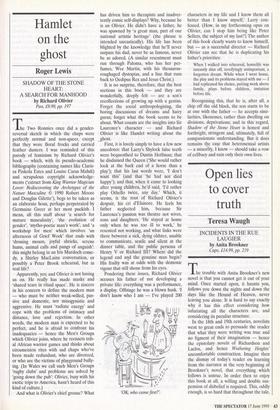Hamlet on the ghost
Roger Lewis
SHADOW OF THE STONE HEART: A SEARCH FOR MANHOOD by Richard Olivier Pan, £9.99, pp. 197 The Two Ronnies once did a gender- reversal sketch in which the chaps were perfectly normal and non-queer, except that they wore floral frocks and carried feather dusters. I was reminded of this parody of feminism by Richard OliVier's book — which, with its pseudo-academic bibliography (containing names like Claris- sa Pinkola Estes and Louise Carus Mandi) and scrupulous copyright acknowledge- ments (`extract from King Warrior Magician Lover: Rediscovering the Archetypes of the Nature Masculine © 1990 Robert Moore and Douglas Gilette'), begs to be taken as an elaborate hoax, perhaps perpetrated by Germaine Greer at her most puckish. I mean, all this stuff about 'a search for mature masculinity', 'the evolution of gender', `mytho-poetic man's work', and 'a workshop for men' which involves 'an afternoon of Grief Work' that ends with `droning moans, joyful shrieks, serene hums, animal calls and pangs of anguish': this might belong in an Iris Murdoch come- dy, a Shirley MacLaine conversation, or possibly a Peter Brook rehearsal, but in real life?
Apparently, yes; and Olivier is not having us on. He really has made masks and `shared tears in ritual space'. He is sincere in his concern to define the modern man — who must be neither weak-willed, pas- sive and domestic, nor misogynistic and aggressive. He must 'radiate energy' and cope with the problems of intimacy and distance, love and rejection. In other words, the modern man is expected to be perfect, and he is afraid to confront his inadequacies — hence the Men's Groups which Olivier joins, where he reenacts trib- al African warrior games and thinks about circumcision rites with sad chaps who've been made redundant, who are divorced, or who are the victims of playground bully- ing. (In Wales we call such Men's Groups `rugby clubs' and problems are solved by `going down the pub': Olivier, busy with his exotic trips to America, hasn't heard of this kind of culture.) And what is Olivier's chief grouse? What has driven him to therapists and inadver- tently comic self-displays? Why, because he is an Olivier. He didn't have a father, he was spawned by 'a great man, part of our national artistic heritage' (the phrase is intended sarcastically). His life has been blighted by the knowledge that he'll never surpass his dad, never be as famous, never be as adored. (A similar resentment must run through Paloma, who has her per- fumes, Wee Martin, with his thesaurus- roughaged dystopias, and a line that runs back to Oedipus Rex and Jesus Christ.) It is no surprise, therefore, that the best sections in this book — and they are wonderfully, deeply felt — are a son's recollections of growing up with a genius. Forget the social anthropologising, the boring discussions of dreams and hairy gurus; forget what the book seems to be about. What counts are the insights into Sir Laurence's character — and Richard Olivier is like Hamlet writing about the , ghost.
First, it is lovely simply to have a few new anecdotes: that Larry's Shylock false teeth were bequeathed to Dustin Hoffman; that he disdained the Queen (`She would rather look at the back end of a horse than a play'); that his last words were, 'I don't want this' (and that 'he had not died happy'); and that, when it came to looking after young children, he'd said, 'I'd rather play Othello twice, any day.' Which, it seems, is the root of Richard Olivier's despair, his cri d'Elsinore. He feels his father neglected him, because Sir Laurence's passion was theatre not wives, sons and daughters. 'He stayed at home only when he was too ill to work,' he resented not working, and what links were there between a sick, dying oldster, unable to communicate, senile and silent at the dinner table, and the public persona of Henry V or Richard III? Where did the legend end and the genuine man begin? His frailty was at odds with the demonic vigour that still shone from his eyes.
Pondering these issues, Richard Olivier accuses his father of not developing a private life: everything was a performance, a display. Offstage he was a blown husk. 'I don't know who I am — I've played 200 characters in my life and I know them all better than I know myself,' Larry con- fessed. (How, in my forthcoming opus on Olivier, can I stop him being like Peter Sellers, the subject of my last?) The author of this book clearly wants to know himself, but — as a successful director — Richard Olivier can see that he is duplicating his father's priorities:
When I walked into rehearsal, homelife was instantly shut off, terrifyingly unimportant, a forgotten dream. While when I went home, the play and its problems stayed with me — I had replicated his choice, putting work above family, plays before children, imitation before life.
Recognising this, that he is, after all, a chip off the old block, the son starts to be at one with the father — he accepts simi- larities, likenesses, rather than dwelling on divisions, deprivations; and in this regard, Shadow of the Stone Heart is honest and forthright, stringent and, ultimately, full of compassionate understanding. But it does remains the case that heterosexual artists — a minority, I know — should take a vow of celibacy and ruin only their own lives.


































































 Previous page
Previous page